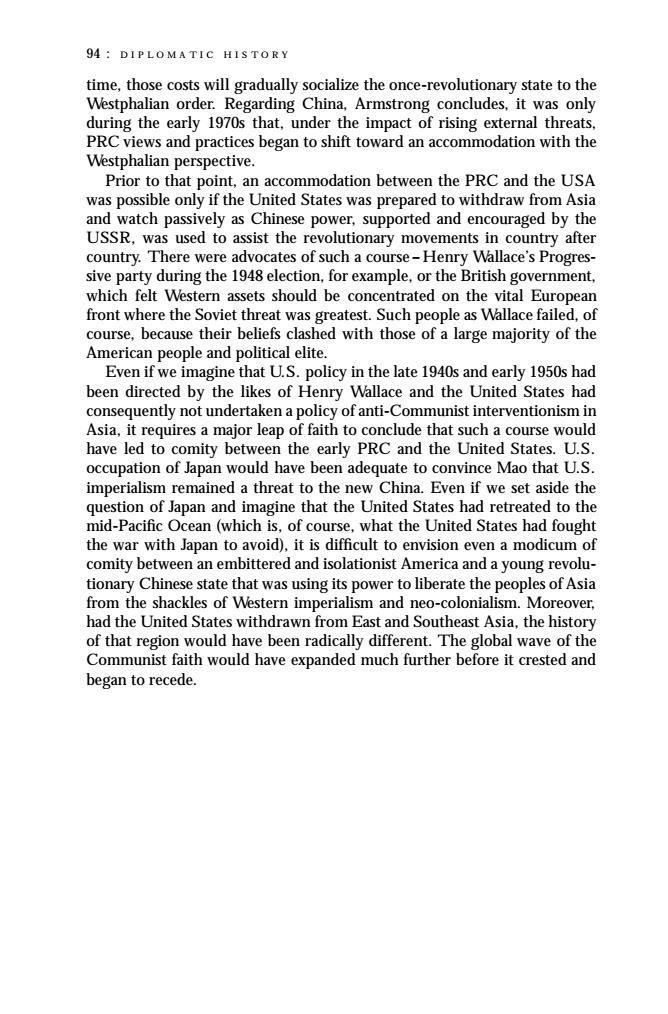正在加载图片...

94:DIPLOMATIC HISTORY time,those costs will gradually socialize the once-revolutionary state to the Westphalian order.Regarding China,Armstrong concludes,it was only during the early 1970s that,under the impact of rising external threats, PRC views and practices began to shift toward an accommodation with the Westphalian perspective. Prior to that point,an accommodation between the PRC and the USA was possible only if the United States was prepared to withdraw from Asia and watch passively as Chinese power,supported and encouraged by the USSR,was used to assist the revolutionary movements in country after country.There were advocates of such a course-Henry Wallace's Progres- sive party during the 1948 election,for example,or the British government, which felt Western assets should be concentrated on the vital European front where the Soviet threat was greatest.Such people as Wallace failed,of course,because their beliefs clashed with those of a large majority of the American people and political elite. Even if we imagine that U.S.policy in the late 1940s and early 1950s had been directed by the likes of Henry Wallace and the United States had consequently not undertaken a policy of anti-Communist interventionism in Asia,it requires a major leap of faith to conclude that such a course would have led to comity between the early PRC and the United States.U.S occupation of Japan would have been adequate to convince Mao that U.S. imperialism remained a threat to the new China.Even if we set aside the question of Japan and imagine that the United States had retreated to the mid-Pacific Ocean (which is,of course,what the United States had fought the war with Japan to avoid),it is difficult to envision even a modicum of comity between an embittered and isolationist America and a young revolu- tionary Chinese state that was using its power to liberate the peoples of Asia from the shackles of Western imperialism and neo-colonialism.Moreover, had the United States withdrawn from East and Southeast Asia,the history of that region would have been radically different.The global wave of the Communist faith would have expanded much further before it crested and began to recede.94 : D I P L O M A T I C H I S T O R Y time, those costs will gradually socialize the once-revolutionary state to the Westphalian order. Regarding China, Armstrong concludes, it was only during the early 1970s that, under the impact of rising external threats, PRC views and practices began to shift toward an accommodation with the Westphalian perspective. Prior to that point, an accommodation between the PRC and the USA was possible only if the United States was prepared to withdraw from Asia and watch passively as Chinese power, supported and encouraged by the USSR, was used to assist the revolutionary movements in country after country. There were advocates of such a course – Henry Wallace’s Progressive party during the 1948 election, for example, or the British government, which felt Western assets should be concentrated on the vital European front where the Soviet threat was greatest. Such people as Wallace failed, of course, because their beliefs clashed with those of a large majority of the American people and political elite. Even if we imagine that U.S. policy in the late 1940s and early 1950s had been directed by the likes of Henry Wallace and the United States had consequently not undertaken a policy of anti-Communist interventionism in Asia, it requires a major leap of faith to conclude that such a course would have led to comity between the early PRC and the United States. U.S. occupation of Japan would have been adequate to convince Mao that U.S. imperialism remained a threat to the new China. Even if we set aside the question of Japan and imagine that the United States had retreated to the mid-Pacific Ocean (which is, of course, what the United States had fought the war with Japan to avoid), it is difficult to envision even a modicum of comity between an embittered and isolationist America and a young revolutionary Chinese state that was using its power to liberate the peoples of Asia from the shackles of Western imperialism and neo-colonialism. Moreover, had the United States withdrawn from East and Southeast Asia, the history of that region would have been radically different. The global wave of the Communist faith would have expanded much further before it crested and began to recede